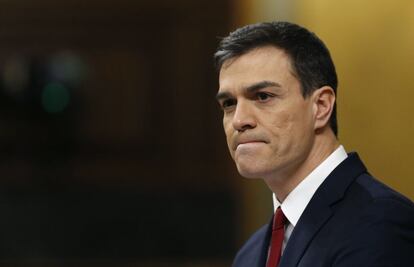Sánchez calls for support to pull Spain out of current political impasse
PSOE leader uses investiture speech to encourage parties to vote for “government of change”

Socialist Party (PSOE) leader Pedro Sánchez made his much-anticipated investiture speech in the Spanish Congress on Tuesday afternoon, offering “a government of change and of dialogue” that would overcome the current political impasse, and that, above all, would rectify the consequences of four years of Popular Party (PP) government.
During his nearly 90-minute address to the deputies in Spain’s lower house, the politician appealed for the support he will need from other parties if he is to be voted in as prime minister this week. The December 20 general election was won by the incumbent PP, but the party fell well short of the seats needed for a majority. Sánchez, who was invited to form a government by King Felipe VI, has closed a deal with emerging center-right group Ciudadanos, but will still need the support or abstention of other parties if his bid to lead Spain is to be successful.
Eighteen million Spaniards are expecting a different government, one that will repair the consequences of the mistakes that have been made PSOE leader Pedro Sánchez
“Eighteen million españoles and españolas [Spanish men and women] voted for the current government to not continue,” he said during his address. “Eighteen million Spaniards are expecting a different government, one that will repair the consequences of the mistakes that have been made and clear the path for different, and better, policies.”
The most-repeated word during the speech was “change,” and the Socialist chief painted himself as the only option to pull Spain out of the situation created by the inconclusive general elections last year. Only the PSOE, he argued, can bring together a government of change in Spain.
He once again ruled out the possibility of a major pact between his party and its traditional rival, the PP. The only option, he continued, would be a cross-party deal with the groups that want change. That idea was repeated by Sánchez as many as a dozen times.
“Do we want a government based on agreement? Yes or no?” he asked the assembled deputies.
Without mentioning them specifically, Sánchez launched an appeal to anti-austerity left-wing group Podemos
Without mentioning them specifically, Sánchez launched an appeal to anti-austerity left-wing group Podemos, mentioning proposals such as an emergency plan for 750,000 families in need, among others. All of these proposals, he explained, could be put into place the very next week should Podemos make way for his investiture by abstaining during the vote.
Spain’s political parties will not officially lay out their positions until Wednesday morning, but Podemos has already suggested it will vote against Sánchez.
Even with the support of Ciudadanos, Sánchez can only count on 130 votes from the 176 needed for an absolute majority in Wednesday night’s vote. On Friday night, when he simply needs more votes in favor than against, it will still not be enough to be successful in his bid to lead the government. Depending on the outcome of this week’s sessions in Congress, Spain could be looking at fresh elections later in the year.
English version by Simon Hunter.
Tu suscripción se está usando en otro dispositivo
¿Quieres añadir otro usuario a tu suscripción?
Si continúas leyendo en este dispositivo, no se podrá leer en el otro.
FlechaTu suscripción se está usando en otro dispositivo y solo puedes acceder a EL PAÍS desde un dispositivo a la vez.
Si quieres compartir tu cuenta, cambia tu suscripción a la modalidad Premium, así podrás añadir otro usuario. Cada uno accederá con su propia cuenta de email, lo que os permitirá personalizar vuestra experiencia en EL PAÍS.
¿Tienes una suscripción de empresa? Accede aquí para contratar más cuentas.
En el caso de no saber quién está usando tu cuenta, te recomendamos cambiar tu contraseña aquí.
Si decides continuar compartiendo tu cuenta, este mensaje se mostrará en tu dispositivo y en el de la otra persona que está usando tu cuenta de forma indefinida, afectando a tu experiencia de lectura. Puedes consultar aquí los términos y condiciones de la suscripción digital.








































